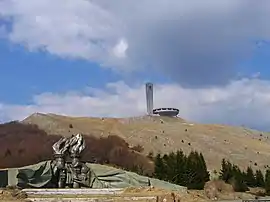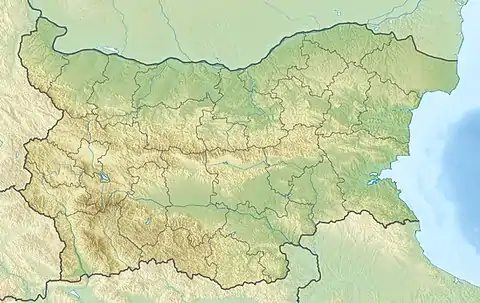Buzludzha
Buzludzha (Bulgarian: Бузлуджа [ˈbuzɫod͡ʒɐ]) is a historical peak in the Central Balkan Mountains, Bulgaria. The mountain is located to the east of the Shipka Pass near the town of Kazanlak and is a site of historical importance. The peak is 1,432 metres (4,698 feet) high.[2] It was renamed to Hadzhi Dimitar (Хаджи Димитър) in 1942 but remains popularly known as Buzludzha.[3] The summit is limestone and granite. Its slopes are covered with grassy vegetation; its foothills and the neighbouring peaks sustain beech forests.[3] The peak's name derives from Turkish: buzlu 'icy'.
| Buzludzha | |
|---|---|
| Бузлуджа | |
 | |
| Highest point | |
| Elevation | 1,432 m (4,698 ft) [1] |
| Coordinates | 42°44′8.88″N 25°23′37.68″E |
| Geography | |
 Buzludzha Location in Bulgaria | |
| Location | Stara Zagora Province, Bulgaria |
| Parent range | Balkan Mountains |
History
In 1868 it was the place of the final battle between Bulgarian rebels led by Hadzhi Dimitar and Stefan Karadzha[4] and forces of the Ottoman Empire. On 31 July, Hadzhi Dimitar and a band of 30 chetniks fought a losing battle against 700 Ottoman troops; only four Bulgarians survived.[5] Their action served as an inspiration for the Liberation of Bulgaria from the Ottomans ten years later; the decisive battle of that conflict was fought a few miles away at the Shipka Pass. The battle of Buzludzha inspired the renown Bulgarian poet and revolutionary Hristo Botev to write the poem "Hadzhi Dimitar":
He who falls while fighting to be free
can never die: for him the sky
and earth, the trees and beasts shall keen,
to him the minstrel's song shall rise…[6]
In 1891 the mountain was the site chosen for the first congress of the Bulgarian Social Democratic Workers Party (later the Bulgarian Communist Party) led by Dimitar Blagoev. In 1944 the peak was the scene of fighting between Communist partisans and detachments of the Bulgarian Army when the latter were attacked whilst operating there.[7]
Following a desire for a national monument at the peak to commemorate these events (proposed as early as 1898) the Buzludzha Monument was built between 1971 and 1981, by public subscription.[8] The site has several other monuments to its history: A statue of Hadzhi Dimitar, a relief of the 1891 Congress, and a monument to the partisans who fought there in 1944. In 1974, TNT blasting was employed to remove more than 15,000 cubic metres of rock and create a level foundation for building the new memorial house. As a result, the peak was lowered by 9 metres (30 feet) – from 1,441 metres (4,728 feet) to its current height of 1,432 metres (4,698 feet).[9]
Travel
Buzludzha can be reached by two side roads from the Shipka Pass:[10] either a 16 km (10 mi) road from Kazanlak in the south or a 12 km (7 mi) road from Gabrovo on the north side of the mountain.
In popular culture
In the opera Frankenstein by Mark Grey, the creature is discovered at a point with coordinates 42°44'09.4"N 25°23'37.6"E, which are those of the Buzludzha Monument.
See also
Citations
- History at buzludzha-monument.com; retrieved 13 July 2019
- History at buzludzha-monument.com; retrieved 13 July 2019
- Geographic Dictionary of Bulgaria 1980, p. 516
- The Rough Guide to Bulgaria. Rough Guides. 2002. pp. 302. ISBN 978-1-85828-882-6.
- The Battle of Buzludzha at shipka museum.org; retrieved 26 July 2018 (Bulgarian)
- "Hristo Botev: "Hadzhi Dimitar"". Literary Club. Retrieved 27 July 2018.
- The Mountain at buzludzha-monument.com; retrieved 26 July 2018
- History at buzludzha-monument.com; retrieved 26 July 2018
- History at buzludzha-monument.com; retrieved 13 July 2019
- The Rough Guide to Bulgaria (2008) ISBN 978-1-85828-068-4 p. 297
References
- Мичев (Michev), Николай (Nikolay); Михайлов (Mihaylov), Цветко (Tsvetko); Вапцаров (Vaptsarov), Иван (Ivan); Кираджиев (Kiradzhiev), Светлин (Svetlin) (1980). Географски речник на България [Geographic Dictionary of Bulgaria] (in Bulgarian). София (Sofia): Наука и култура (Nauka i kultura).
Bibliography
Adrien Minard, Bouzloudja. Crépuscule d'une utopie, Paris, Éditions B2, 2018.